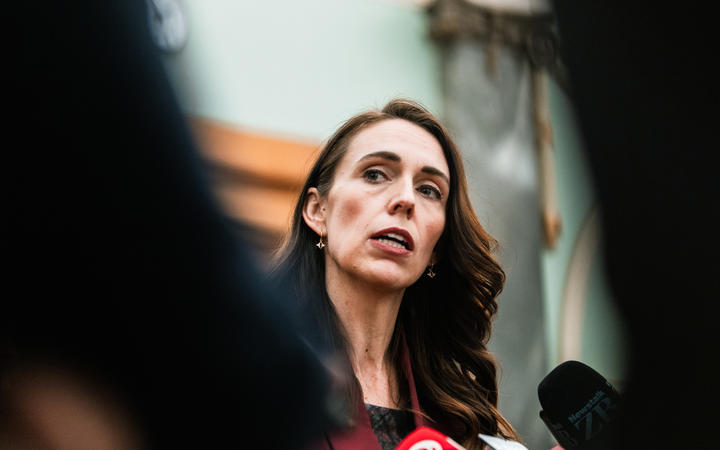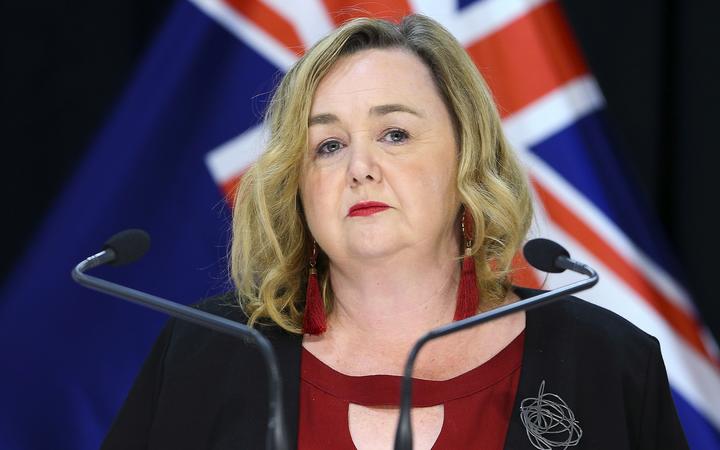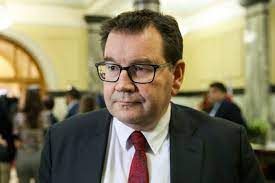
And Prime Minister Jacinda Ardern said while she wants to find out if last night's event - which saw power cuts to thousands of North Island homes - could have been prevented, "it was not good enough that we could not warm our homes".
Ardern said they should know more about what happened this afternoon.
Transpower earlier today said Kiwis were close to another power crisis this morning after tens of thousands of Kiwis were plunged into darkness last night.
General manager of operations Dr Stephen Jay told The New Zealand Herald he couldn't rule out any further disruption to the network, stating "the emergency is far from over".
"Things are running tight. Supplies have been running to the wire this morning."
Last night's outages affected parts of Wellington, Kāpiti Coast, Taupō, Hamilton, Napier, Hastings, Auckland and Whangārei.
None were warned yesterday that they would be without power, on a night which saw many cities head towards, or below, zero degrees.

She had asked MBIE to get some clarity around who and how they should be communicating with consumers to allow people to prepare.
After an event like last night they were looking into what happened and MBIE would be in charge of that.
It "wasn't acceptable" for Kiwis not to have power on one of the coldest nights of the year.
Woods said she would ask why Huntly wasn't "fired up" and left idle.
"If they failed us I need to know why."
Asked who had oversight of the generation capacity, Woods said there were responsibilities for Transpower and the electricity authority "to ensure that we are operaing in a way in which it should do for New Zealanders".
National Party leader Judith Collins likened the outage to that which happened in a third world country.
"We do not live in a third world country.
"It was one of the coldest nights of the year last night and many families couldn't keep warm.
"We should always expect that it will be colder in winter and we'll need to use more energy, but the Government has failed New Zealanders by not being prepared.
"The Government has to be able to keep the lights on. This useless lot has failed to do that. "

But he added that he didn't regret the oil and gas ban and said it wasn't related to last night's issues at all.
Many people took to social media to vent their frustration with many asking how this could happen in this day and age.
Woods was this morning in urgent talks with Transpower and the Electricity Authority.
Woods told media this morning - in a standup with the Prime Minister alongside her - that the link between the North and South Islands was only operating at 50% capacity last night.
She said questions were being asked about whether the network was fit for purpose.
She questioned whether people had enough notice that power supplies would be cut.
Transpower this morning said it was trying to understand why there was not enough power to avoid a repeat.
"Last night, demand over the evening period reached record levels of around 7,100 MW between 6 pm and 6:30 pm," said Jay.
"Unfortunately, there was not enough generation to meet demand. As a result, Transpower had to ask all the local lines companies and large industrial users to reduce demand to help keep the system in balance. Beyond temporarily cutting power to hot water cylinders, some customers were disconnected.
"Together with the sector, we will work to understand why there was not enough last night, to avoid a repeat."
While apologising to everyone who lost power, Jay said under normal circumstances there was typically more generation available in the system so that it could cope with high demand as well as the potential for other faults.
"With the widespread cold weather, we had been looking ahead to the evening peak throughout the day;" said Jay.
"We expected things to be tight due to some major generating units being unavailable and signalled to the market that other generation was required, and that demand should be voluntarily reduced where possible.
"Unfortunately, this is what came to pass. The prompt action of local lines companies and others in reducing demand helped keep the system in balance and prevented even wider problems.
"Problems such as last night's are very rare indeed and we will now be working with the sector to do all we can to avoid a repeat."
Jay said the outages occurred as record demand coincided with insufficient generation which resulted in the need to reduce demand to maintain system security.
"We apologise to everyone who was affected last night. It is fair to expect electricity to be there for people when they need it most, especially on one of the coldest nights of the winter."
National and Act MPs have put some of the blame of the power cut on the Government, saying its moves to cut gas production had a part to play.
Act's energy spokesman Simon Court said the Government had neglected to tend to a key issue: energy security. That had put families in the cold, and endangered those with medical conditions.
"The focus should be on security of supply and affordable electricity, not banning certain fuels."
Jay said Transpower gave more than 24 hours' notice to power distribution companies that supplies were at a critical level, or leading to an "all time record peak".
The first warning was given 4.40pm on Sunday before another warning was given at 1.02pm yesterday.
A final "Grid Emergency Notice" was then issued at 5.10pm stating that power would be out from 6pm until 7pm.
However, in many areas the outage lasted until at least 9pm. Some providers weren't expected to turn that power back on until closer to midnight.
When asked how New Zealand could be in the position to experience such a dire power cut, Jay said he didn't know and that would be investigated today.
He described the outage as a "very rare event" however it had warned all 29 of its "distribution networks" that there could be an issue.
He was unsure if the power outage affected anyone who was reliant on power for medical emergencies.
While the national grid operator claimed there wasn't enough electricity being generated to keep up with record demand created by cold temperatures, some providers said they had plenty.
But Electric Kiwi and Energy Collective chief executive Luke Blincoe told Mike Hosking on Newstalk ZB it was unclear whether rolling black-outs were really needed, on one of the coldest nights of the year.
He said generation doesn't appear to have been at capacity, as several units weren't running at the time.
Power was restored to most homes by 9pm.
North Island electricity company Powerco said its controlled hot-water systems across its network had been switched off to reduce network load and would be progressively switched back on overnight.
Vector said it used hot water control and battery installations to reduce the load on its network, as instructed by Transpower, and no customers were affected by outages.
However, freezing temperatures had put more pressure on power this morning.
MetService meteorologist Amy Rossiter said a southerly low-pressure weather system had resulted in temperatures dropping last night through to the early hours of today.
In Auckland, most parts of the city dropped to 5C at 9pm. The coldest area was in the south, in Ardmore, where the temperature got to 3.3C.
Anyone who lost power in Hamilton would have felt the cold winter bite, as the temperature in much of the city dropped to 0C by 10pm.
Early this morning, between 6am and 7am, the temperature was at its coldest, recording -3.7C.
And in Wellington, much of the city started feeling the cold early yesterday evening, as the temperature dropped to 5C in most parts by 5pm. At 6pm, the temperature was 2.6C in Lower Hutt.
Energy analyst Molly Melhuish this morning warned that surges in electricity demand were only going to become more common.
Melhuish told Newstalk ZB that cold snaps like the one that caused the surge in demand are becoming more common.
Power distribution companies, including WEL Networks, Powerco and Unison are being approached for comment.
A Powerco spokesperson said the outages affecting its network - Palmerston North, New Plymouth, Taranaki - were unplanned outages already affecting the network and were not connected to the Transpower advisory.
To deal with advisory, controlled hot water systems across Powerco's electricity network areas were temporarily switched off to reduce the load on the network and to avoid disconnecting any customers.
Comments
Now ... for all of those people who have purchased EV's lately, this is why the government gave you such a great deal ... you can spend the money on copper-top or energizer AAA batteries to get you to and from work !!
We did actually have the generating capacity, it's just that one greedy overseas owned company at Tiwai Point takes more than it's fair share at much less than the average Kiwi pays ... they should have just pulled the plug on it and everyone would have toasty warm !
Then again, maybe we should go back to trusty old coal fired generating using dirty coal from somewhere overseas, while our top quality coal is there for the taking and would probably last us another 50+ years.
Tiwai has nothing to do with it, they are supplied solely from Manapouri station with no connection from Manapouri to the national grid.
You could turn of tiwai today, and the power station would be closed as there is no way to get that power to the grid at the moment.
I agree that we should be burning our superior quality low emission coal instead of the rubbish getting imported at the moment
As more people buy EVs and want to charge them up after work, the more often this is bound to happen...roll-on hydrogen production and distribution!
How do you think hydrogen is made? Through electrolysis - which uses electricity that has to be generated!
True. But if, like Scotland, you make sure you produce enough electricity through renewable means then you can use the spare to make the hydrogen. That can then be used to power most forms of transport, heat homes etc. The UK is even exploring the possibility of making hydrogen via the N Sea wind farms and using the N Sea gas infrastructure to pipe it to houses. It is possible given the will to do it and getting past the environmentalists who seem to want to stop all development. They just want to burn coal instead.
The problem with renewable energy; no wind - no power; no rain - no power; no sun - no power; no storage - no power; no investment- no power? Fossil fuels provide instant energy at the push of a button. Alternatively one atomic power station could provide all our energy needs for the foreseeable future. Clean green power used by millions of people globally; however, safe management involves more than the use of a piece of No 8 wire!
The key is to use variable sources to generate electricity. It is rare that there is no wind, no sun, no rain and no tides all at one time. Just takers a bit of planning, something we don't seem very good at.
We really should be producing an excess of renewable energy. Where are the wind farms, the tidal and wave power turbines, the much needed storage dams? Held back by government inaction, environmentalists and energy companies. Come on NZ, we should be in a similar position to Scotland, as it is we are decades behind.
Oh, the Market. Nationalise supply.
So the Government which has caused some of this problem, now say's its not good enough, starting to look like mother Russia
The cause was Max Bradford, National government.
Lots of unanswered questions, almost zero transparency, phenomenal obfuscation and increasing evidence of the outright failure of the Govt/free market model that Max Bradford left for us.
He promised us all cheaper power, less likelihood of power cuts and overall increased efficiency, all courtesy of free market involvement.
IMHO the NZ market is to small to operate a fully capitalistic, free market electrical generation and supply industry that will provide both low prices to consumers and the return on investment that both expect. Requiring Govt owned suppliers to maximise profits at any cost does not encourage fair and equitable business practices. We need to rethink the model.
In the meantime we need something like an energy industry Ombudsman, someone who has the power and authority to: cut through the BS; demand companies open their books to him; identify companies that are delaying repair and replacement of worn out generation equipment; or making up figures to calculate consumer charges, or are enforcing unfair trading practices in their supply agreements. Nothing better than naming and shaming to instill an increased level of ethical business behaviour.












